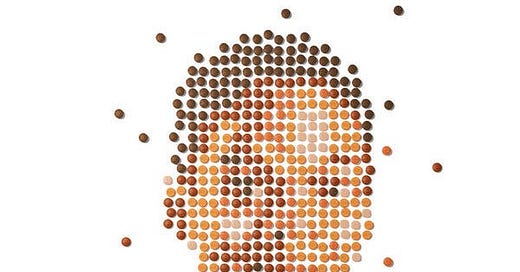The Bluestocking 365: Elon's concubines and smartphone lobotomies
DEI for white male novelists
Happy Friday!
One nice thing I just added to my schedule: I’m talking to National Treasure James Graham about writing for the screen on May 14, as part of the Fleet Street Festival. (Tickets here.) Why did he make Dominic Cummings confusingly hot by having him played by Benedict Cumberbatch? I will demand an answer.
Helen
Have We Been Thinking About ADHD All Wrong? (New York Times)
Can changing a person’s environment really alter their symptoms? In 2016, the M.T.A. research group published a paper that suggested that for many young people, the answer is yes. At that point in the history of the study, the subjects were adults in their mid-20s, able to speak for themselves. So rather than simply collecting data on their symptoms or their height, the scientists asked them questions. They conducted long interviews with 125 of these young adults, all of whom were diagnosed with A.D.H.D. as children.
What the researchers noticed was that their subjects weren’t particularly interested in talking about the specifics of their disorder. Instead, they wanted to talk about the context in which they were now living and how that context had affected their symptoms. Subject after subject spontaneously brought up the importance of finding their “niche,” or the right “fit,” in school or in the workplace. As adults, they had more freedom than they did as children to control the parameters of their lives — whether to go to college, what to study, what kind of career to pursue. Many of them had sensibly chosen contexts that were a better match for their personalities than what they experienced in school, and as a result, they reported that their A.D.H.D. symptoms had essentially disappeared. In fact, some of them were questioning whether they had ever had a disorder at all — or if they had just been in the wrong environment as children.
[…] Seen through this lens, the problem for John and Cap and many other adolescents becomes a much more mundane one than a brain disorder. Their problem is the simple fact that high school can be really boring, and without medication, they have a low tolerance for boring stuff.
*
How we conceptualise ADHD — and other disorders with no clear biomarkers — is a challenging question, and one that has big implications for how we treat it. “Increasingly, research suggests that for many people A.D.H.D. might be thought of as a condition they experience, sometimes temporarily, rather than a disorder that they have in some unchanging way.”
That doesn’t really fit with our identity model of disorders: witness all those TikToks about “things you only understand if you have an ADHD brain.” But it does suggest that for people with milder symptoms, there might be environmental changes that could really help them—are we currently jamming children into a single model of learning and behaviour that suits some but not others?
For me, though, the most interesting bit of this piece is the suggestion that Adderall and other ADHD medications improve behaviour, but not performance. Children feel (and are) more focused and less fidgety, but their test scores don’t improve. And then the effects on behaviour fade away, too: “After the first year of treatment, the relative positive effects of Ritalin on behavior started to shrink, and by the end of the third year, they had disappeared altogether.” (Oh, and stimulants inhibit adolescent growth.)
Most teenagers come off the medication within a year, a phenomenon which is well known enough to lead to this statement being published in ADDMagazine: “To accept treatment, teens need to feel A.D.H.D. as problematic, as a pain in their life that limits and controls them. Too many parents normalize their children’s struggles to make them feel better.” This feels . . . troublesome? Tell your kid who doesn’t like feeling tweaked all the time that his untreated ADHD is worse than it is, to make sure he stays on the meds?
The Tactics Elon Musk Uses to Manage His ‘Legion’ of Babies—and Their Mothers (WSJ, £)
Musk refers to his offspring as a “legion,” a reference to the ancient military units that could contain thousands of soldiers and were key to extending the reach of the Roman Empire.
During St. Clair’s pregnancy, Musk suggested that they bring in other women to have even more of their children faster. “To reach legion-level before the apocalypse,” he said to St. Clair in a text message viewed by The Wall Street Journal, “we will need to use surrogates.”
He has recruited potential mothers on his social-media platform X, according to some of the people.
Musk has used his wealth to buy the silence of some women who have his kids, according to St. Clair as well as other people, text messages and documents reviewed by the Journal.
*
This piece strongly makes the case for old-fashioned reporting, because it’s the details that make your eyebrows shoot up. Musk might have 13 children that we know about, but the real figure seems likely to be much higher. (This is very plausble: As I write in The Genius Myth, Pavel Durov of Telegram claims to have 100 children via sperm donation.)
What emerges here is a portrait of a man who wants total control but no responsibility. The baby mamas are offered loads of money in exchange for an NDA that means they can never speak about the paternity of their children, or disparage their benefactor. Musk is under no reciprocal obligation not to bad-mouth them, however, and also did not (in the case of St Clair) want to be on the birth certificate or fulfil a DNA test. He wants his glorious genes to live on, but he also wants to pick and choose which bits of parenthood he fancies. He will give the women money, but on his terms and in return for the fulfilment of his demands.
St Clair describes being caught up in “harem drama” and this is exactly what all this will remind you of—Musk is like a Chinese emperor, and Shivon Vilis is the Lady of Bright Deportment while St Clair is merely a Lady of Mediocre Talent1. Although Musk might talk a lot about the future, he’s living like a Khan or sultan from the middle ages. The Christian tradition of monogamy, even for the most powerful men, developed in opposition to this. (A rare exception is the Mormon faith, and sure enough, Musk has a Mormon guy called Jared to manage all his courtesans.)
For me, though, the highlight of the piece is Musk texting her during the election to say “In all of history, there has never been a competitive army composed of women. Not even once.” Not sure there’s ever been a competitive army composed of unfit dudes on ket, either. (The Spartans were many things, but not 24/7 poasters.) Historians, please advise.
Quick Links
“Every time this argument is made, the same names are rolled out: DeLillo and Updike and Martin Amis and so on. Wherever the new white male novelists come from, they will surely come from a broader tradition than that. I sometimes feel like I am being asked to believe in DEI for white male novelists who want to write sequels to the great novels of the 1970s.” Very bracing essay by Henry Oliver on white men not getting the same opportunities in publishing as they once did. He correctly notes that most good art doesn’t pay, and also that the male writing crisis is really a male reading crisis—the audience for novels right now is women. (Common Reader, Substack)
How to “give your smartphone a lobotomy”. One of the recommendations is to move all the social media apps to an old phone that only works on wifi, or to your desktop computer. I’m totally doing this.
Thanks to Matt Muir for this link: a lo-fi website where people could submit their weight and height, and you could see what different body shapes look like.
“From then on, Carter-Ruck communicated with the Charity Commission on behalf of both Hellmich and [Naomi] Campbell. At the time, it went unnoticed that the email address purporting to be Campbell’s personal Gmail was in fact different by a single character.” Naomi Campbell was notoriously banned from being a trustee after her British charity’s finances were investigated. She now claims she was the victim of identity theft—by a fellow trustee (Financial Times, £)
“I’d say that everybody has seen every plot 20 times. What they haven't seen is characters and their relation to one another.” Loved these screenwriting tips from Howard Hawks, via Tony Tost (Substack)
“Immigration, White supremacy and eugenics are subjects bubbling close to the surface in Gatsby. These were the obsessions of the Long Island aristocrats that F. Scott Fitzgerald is observing, with a personal connection to them.” Adam Rutherford on the book’s 100th anniversary (Substack).
“In March, Mary Gordon, a great-niece of the SNP’s founder, chalked a message on a government building in Edinburgh: “Women’s rights are not a hate crime.” Soon after, two uniformed police officers visited her house to warn her that she could be arrested for breach of the peace if she repeated the protest.” The FWS ruling at the Supreme Court, which concerned Scottish legislation from 2018, sent me back to this piece I wrote in the middle of the pandemic, about how gender and Alex Salmond were causing a split in the SNP (Atlantic, gift link)
The Bluestocking will soon be running a reduced service—much like the Tube on weekends—as I get close to achieving my goal of being on every podcast, ever, in the run-up to publication of The Genius Myth. Take pity on my vocal cords by pre-ordering here (UK) or here (US).
And use GENIUS25 for 25% off the ticket price for my event with Armando on June 19:
See you next time! If you want to subscribe, click here:
A full list of Chinese concubine ranks is available on Wikipedia.






Not a historian, but the Mino (women's regiments) of the kingdom of Dahomey seem like an instant disproof of Musk: two hundred plus years of Spartan-style slaving, massacring and town-storming. Or more cheerfully, there's the women's units of the Kurdish militia, defeating Islamic State in Kobani.
I was diagnosed with ADHD in my 40s and found the medication really helpful. Crucially it helped me regulate my emotions which makes my life much easier. I do agree that the environment makes a difference as evidenced by the reduction in my stress levels now I'm in a more flexible job, and the increase in stress when I've had bad line managers.